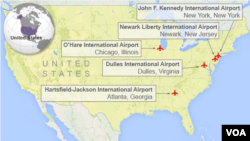The nursing assistant in Spain infected with Ebola is now in stable but critical condition. The first person known to have contracted the disease outside of the Ebola area in West Africa, Teresa Romero became infected while with a hospital team treating two Spanish missionaries with Ebola who later died. An Ebola expert outlined the steps health workers should take to ensure they don’t fall victim to the virus.
Ebola is passed from one person to another through bodily fluids, and infected people are only contagious when they start to feel ill and exhibit symptoms.
That's why health care workers must be shielded head to toe in protective clothing as they care for patients. Spanish nursing assistant Romero said she doesn’t know how she got Ebola. But health authorities think she may have become infected after touching her gloved hand to her face while taking off her protective gear.
Ebola expert Tom Ksiazek, a professor at the University of Texas Medical Branch in Galveston, Texas, said properly removing the protective clothing is vital.
“Contaminating one’s face, particularly the mucus membranes -- your eyes, nose and mouth -- is probably the route that most people who get infected with Ebola are exposing themselves by and that includes health care workers,” he said.
He said that can be avoided with proper precautions. "Part of what stops that from happening is an appropriate level of training, and also supervision during the process of wearing and taking it off by other individuals who are monitoring you.”
Ksiazek is a former official with the Centers for Disease Control and Prevention in Atlanta, Georgia. He recently returned from monitoring a CDC mission in Sierra Leone -- where outbreaks continue. He said it’s hard to control Ebola in the worst-affected West African countries -- Sierra Leone, Liberia and Guinea -- which suffer from poor health care, a lack of medical equipment, and more.
"I think is largely a matter of the scope being more difficult to handle by the time outside assistance and resources were brought to bear,” he said.
The U.S. government has taken measures to ensure American hospitals are prepared to treat Ebola patients, after the first documented case in Texas, a Liberian man who traveled to the United States. Hospitals are quarantining people who could be at risk. Ksiazek said any U.S. hospital should be capable of treating someone with Ebola.
"In terms of risk to the general population, the procedures they’ll follow will minimize this to the individual who brought it, and perhaps individuals who were, unfortunately, exposed before the isolation of the individual and in his care by people who are taking the appropriate precautions,” said Ksiazek.
Ksiazek bases his confidence on the U.S. health system's success six years ago in containing a case of Marburg Virus, a deadly disease related to Ebola.
"The normal level of infection control used in the U.S. is such that they would minimize the chance of spread to begin with. The type of general hospitals that we have are quite capable of handling this,” he said.
If proper protocols were followed around the world, health care providers who work with Ebola patients would be safer.






